UCL is conducting research into how social welfare law problems can damage health, and how doctors and lawyers can work together to help make people better. Fiona Bawdon explains. Fiona is head of communications at The Legal Education Foundation.
The man had been in hospital for weeks and weeks, after making what his doctor described as ‘huge lacerations to his wrists’. It was his second suicide attempt. A while earlier, he had ‘taken a really large overdose of medication’. On going through his medical records, his GP was puzzled: there was no history of depression. It turned out that the root of the man’s despair was as much legal as medical. ‘He was having housing difficulties and he basically thought his life wasn’t worth living because of his situation.’ What was needed to ‘cure’ him, was not a medical intervention, but a legal one: help from a lawyer to resolve his housing situation.
A young mum, similarly, found it was a legal prescription, rather than a medical one, which was needed to cure her baby son’s asthma. After repeat visits to her GP because of the infant’s recurring rash and breathing difficulties, it became clear it was his living conditions that were making him ill. The flat where they lived had poor heating and ventilation and was rife with damp, mould and bugs. Rats ate food in the kitchen cupboards, and even the baby’s clothes and nappies. The mum had contacted her local authority umpteen times, but nothing was done. Her doctor realised the baby’s health would never improve while they lived in such poor conditions and referred her to the legal clinic based in the surgery building. A housing lawyer wrote to the council listing all the problems with the flat and demanding an urgent review; after which, the local authority agreed she should be rehoused.
A key strand of The Legal Education Foundation’s funding in 2018 has been supporting the development of integrated health and legal services, in order to tackle what Professor Dame Hazel Genn, director of UCL Centre for Access to Justice, calls ‘health-harming legal needs’. These are everyday but serious problems which damage people’s mental and physical health, and can be resolved by legal advice or representation, rather than a medical prescription.
They are the kind of problems that no amount of medication or medical expertise alone can fix. As in the examples above – drawn from UCL’s research funded by TLEF – this could be difficulties with housing, whether living in sub-standard accommodation or homelessness. Or, equally harmful to health might be problems to do with employment – working in unsafe conditions, harassment, or unfair dismissal; domestic violence; being wrongly refused disability benefits; or a child with special needs, not getting the support they are legally entitled to at school. Social welfare problems cause stress which affects people’s mental wellbeing, and can also have a direct impact on people’s physical health: overcrowded accommodation which makes it difficult to prepare food; lack of income which prevents healthy lifestyle choices.
*

Academic Professor Hazel Genn on tackling ‘health harming legal needs’
Prof Genn is a leading authority on the links between unmet legal need and ill health, an interest which grew out of her pioneering access to justice research. She says: ‘It was clear to me that one place people go to when they have legal problems is their doctor’s surgery: either because legal problems are making them ill, or they think the doctor might be able to help.’ Often, people will go to their GP, because they don’t know who else to ask for help with things like filling in forms, writing letters, or dealing with benefits claims.
Prof Genn’s earlier research had shown that legal problems often come in ‘clusters’: people who have one legal problem tend to have several of them. It also showed that vulnerable groups are more likely to have such problems, but less likely to do anything about them; and unchecked legal problems can ‘trigger a cascade of crises’ that create illness, or make existing illnesses worse. Prof Genn explains how crises build: ‘You start out with an employment problem, end up with eviction, and then family breakdown.’ She adds: ‘There is a clear connection between unresolved legal problems and ill health. Legal assistance is the single right that makes our other rights viable.’
In 2016, UCL’s Access to Justice Centre opened an integrated legal advice clinic at the Guttman Centre for Health and Wellbeing in Stratford, a diverse area of east London with high levels of deprivation in parts. The health centre is home to the Liberty Bridge GP practice, and accepts patients from across the borough.
The legal advice clinic is led by solicitor Rachel Knowles, and has a team of lawyers and case workers offering free legal advice on housing, welfare benefits, education and community care issues. Law students at UCL are also offered the chance to work there, either as volunteers, or as part of their degree curriculum. The clinic has subsequently moved premises (see below), but at the time it was based at the health centre two days a week. Patients could refer themselves to the ‘pop-up’ clinic, or be referred by their doctors: UCL devised a referral form, where GPs can set out if a patient’s health may be being affected by a legal problem.
For Prof Genn, the launch of the integrated clinic was the realisation of a long-held ambition to locate community lawyers in health centres or GP surgeries. These are the places where people already go to and trust, which reduces the stigma and unfamiliarity that can otherwise act as a deterrent to seeking legal advice.
*
TLEF chief executive Matthew Smerdon has also had a long-standing interest in health justice partnerships, which stemmed from his time at Community Links, a charity in east London, which in the late 1990s and early 2000s, ran outreach advice services in more than 20 local GP surgeries. Matthew had seen how well such partnerships could work, but also how financially fragile they were, as they were funded by short- term regeneration grants, never making the transition into mainstream health budgets. He had witnessed a pattern, repeated across the country, of health justice partnerships in one form or another springing up in response to local need, but then withering away through lack of longer term funding, rather than lack of demand. Matthew could see there was a need for greater coordination of effort, better communication between local projects, and collection of evidence to influence mainstream health strategy.
TLEF has funded a number of health justice partnerships since its inception. The launch of UCL’s integrated clinic provided the foundation with the chance to act strategically, by funding research measuring the impact of social welfare law advice on people’s health. The hope is that this evidence will be used to inform thinking, make the case for funding, and help develop sustainable models of health justice partnerships.
As Professor Jonathan Montgomery, chair of the Health Research Authority, said in November 2017, in times of austerity, health justice partnerships will have to be ‘robustly justified’, if they are to compete for public funding. Prof Montgomery was speaking at an international health justice workshop, funded by TLEF and chaired by Prof Genn. He went on to say that lawyers and medics need to find a ‘common currency’ for researching and evaluating health justice partnerships, which means developing a ‘new research paradigm’. The workshop was ground-breaking, as it brought together leaders from the UK legal, medical and public health sectors (Professor Sir Malcolm Grant, chairman of NHS England gave the keynote), plus health justice experts from Australia and America. Prof Genn says the event was ‘an absolute first. It was remarkable that we managed to have such senior NHS people there.’ She adds that the ripple effect from the gathering continues: ‘I am still in close contact with the heads of the American and Australian national health justice organisations. We regularly have phone or Skype conferences, and we are trying to work together because we have shared objectives.’
The long-term ambition for TLEF and UCL is the creation of a national health justice initiative to create and marshal the evidence base, gather insights into good practice, and develop sustainable models, which provide not just general advice but access to specialist legal help, where needed. Matthew says: ‘The aim is for the health justice sector’s voice to be heard at a strategic and policy level in health agencies, so we start to get commissioning strategies integrating legal advice services as part of their planning, and funding would flow from that. That would address the current problem of funding being sporadic, uncoordinated, fragile and short term.’
Prof Genn stresses that while work on the national initiative is still at a ‘very, very early stage’, the ultimate aim is to create a policy shift. ‘We want people in the health field to recognise that integrated services are a good way of meeting the needs of patients and improving
the health of the population. That, to me, is the ultimate prize.’
*

Rachel Knowles who heads up UCL’s legal advice clinic formerly based at a GP surgery in East London
All of that is, of course, some way into the future.
As far as the TLEF-funded UCL research project was concerned, the immediate task was to find out how many health justice partnerships there already are. Research associate Sarah Beardon set about a mapping exercise, and identified over 380 projects where social welfare legal advice is delivered in a healthcare setting.
Centre for Access to Justice head of projects Shiva Riahi says the results were surprising and heartening. ‘I was really not expecting that many. I’d heard about little pockets of well-established services. To see 380 of them, just goes to show the link is a really intuitive thing, once you clock on to it.’ TLEF was also encouraged by the findings. Matthew says: ‘They were positive because what they show is a bottom-up sector – but one that could benefit from coordination drawing it together.’ It is that coordination role that the foundation hopes a national initiative will ultimately support, which would accelerate wider development of such partnerships.
After the mapping process was complete, a bigger challenge was to develop a research methodology to measure the impact of legal advice on people’s health which was robust, but wouldn’t interfere with the running of the legal clinic. Shiva explains: ‘Everything was focused on how can we run this as the best possible legal service for clients, while still making sure that we are building in the methods to capture as much information as possible.’ Cooperation between lawyers and researchers was key. ‘It was very much a balancing act between the advice team and the research team. Always a very collaborative process,’ she adds.
After some inevitable trial and error, the team settled on an approach which assessed patients’ health and wellbeing when they first sought legal advice, and then at three- and six-month intervals afterwards, using a combination of self-completion surveys, plus face-to-face interviews with a sample of participants. The research also included in-depth interviews with GPs from the Liberty Bridge practice. Clinic solicitor Rachel Knowles says the research was simple and problem-free from the legal team’s point of view.
She adds: ‘The idea is a really good one, in terms of making yourself available to people in the community who may not realise they even have a legal problem, and that’s what’s making their life difficult.’
The final survey responses are still being collated and the research findings are yet to be finalised, but some interesting patterns have emerged so far. Sarah says: ‘Improvements in health are greater in those whose legal problems have been resolved, than in others whose legal problems are ongoing. People who have one legal problem tend to get better; people with multiple legal problems, their health gets worse.’
*
The main problems people had were to do with welfare benefits and housing. Over 80% of those surveyed said their legal problem was affecting their physical health; a similar proportion said their mental health had been affected. The research also showed how long legal problems last: around 60% were still facing difficulties after six months. The areas of most significant improvement were lower levels of stress and anxiety, and greater emotional wellbeing. Of the 55 clients responding to evaluation forms at the end of their case, 33 said they would not have sought advice if they hadn’t discovered the service through their GP; another 13 said the GP connection meant they sought help quicker than they otherwise would have done.
The extra income the lawyers secured for patients through, say, resolving benefits or employment problems, brought a range of practical benefits, including freeing up more time to take care of the family and being able to provide children with basic necessities. A dad reported that his children were no longer reluctant to go to school, now they could have a school lunch every day. The health of a new baby improved after he and his mum were rehoused in better conditions, which meant they no longer needed visits from her midwives.
The research showed legal difficulties can damage health in other ways, too: a patient refused to embark on cancer treatment because they were so stressed about their housing and welfare benefits problems, and didn’t feel they would be able to rest and recover from surgery.
The response from medics was generally positive. Some felt resolving legal problems would be more beneficial than anything they could prescribe. One said: ‘I’m quite sure that addressing those problems would be far more effective than what I’m trying to do as a doctor by simply upping his insulin dose.’
The research is based on a health methodology, rather than a legal one, and Sarah’s background is in public health, not law. Sarah says it was a fascinating and eye-opening project: ‘In public health, you are taught a lot about the social determinants of health. No one ever told me a lot of them were legal problems, and they could be resolved through legal processes. So when I heard about this project, something just clicked. It is really interesting and worthwhile, but also a very simple idea.’
All of those involved agree that a prerequisite, if the health justice movement is to succeed, is collaboration between professions and specialisms which don’t usually see themselves as natural allies. Prof Genn says there is traditionally ‘a natural coolness, if not suspicion’ between the medical and legal profession. For some doctors, a ‘medico- legal partnership’ brings to mind ‘ambulance- chasing clinical negligence lawyers’. Shiva says that when she first went to Clinical Commissioning Group meetings to spread the word about the project, the assumption was she was there to talk about personal injury cases. She says: ‘I felt it was interesting, that when doctors think of lawyers, that’s the first thing that comes to mind.’ Rachel hopes the success of the clinic will help to persuade any doubters. ‘I thought the best thing I can do is focus on creating a really good advice service and really building its reputation, so doctors will want to partner with us.’
Sometimes the issue was simply one of lack of knowledge. Shiva says: ‘Even the GPs who were really supportive didn’t always necessarily see where legal help could come in. It can be a training issue. Recognising the need for legal assistance is not always intuitive.’
After 18 months of running pop-up advice sessions, the legal clinic is now operating full time out of its own separate offices, also in Stratford. The move was forced on them (because the landlords wanted to rent out the space full time at NHS commercial rates), but links with the surgery are continuing. Rachel says the pop-up clinics did bring some logistical problems for the advice team, and, certainly for them, there are benefits to being permanently based in a fully functioning office. Luckily, the move coincided with completion of the research project, and has given the clinic a chance to test other types of health justice partnership.
Legal problems cause ill health but, as Prof Genn says, ill health also causes legal problems – which has long been recognised by some health charities. For example, Macmillan Cancer Support spends more than £20m a year providing early financial and employment advice to people with a cancer diagnosis. In the same spirit, the UCL clinic is now working in partnership with a dementia research project, piloting one-off legal advice, via Skype, to people with the early onset disease.
No doubt different models of health justice partnerships will emerge. For now, the challenge is to raise the profile of health justice work nationally, share successful models of integrated working, and – crucially – to gather and collate evidence of the impact they have on people’s health and wellbeing.
A version of this article will appear in TLEF’s forthcoming 2018 Annual Review, to be published in early January 2019.







